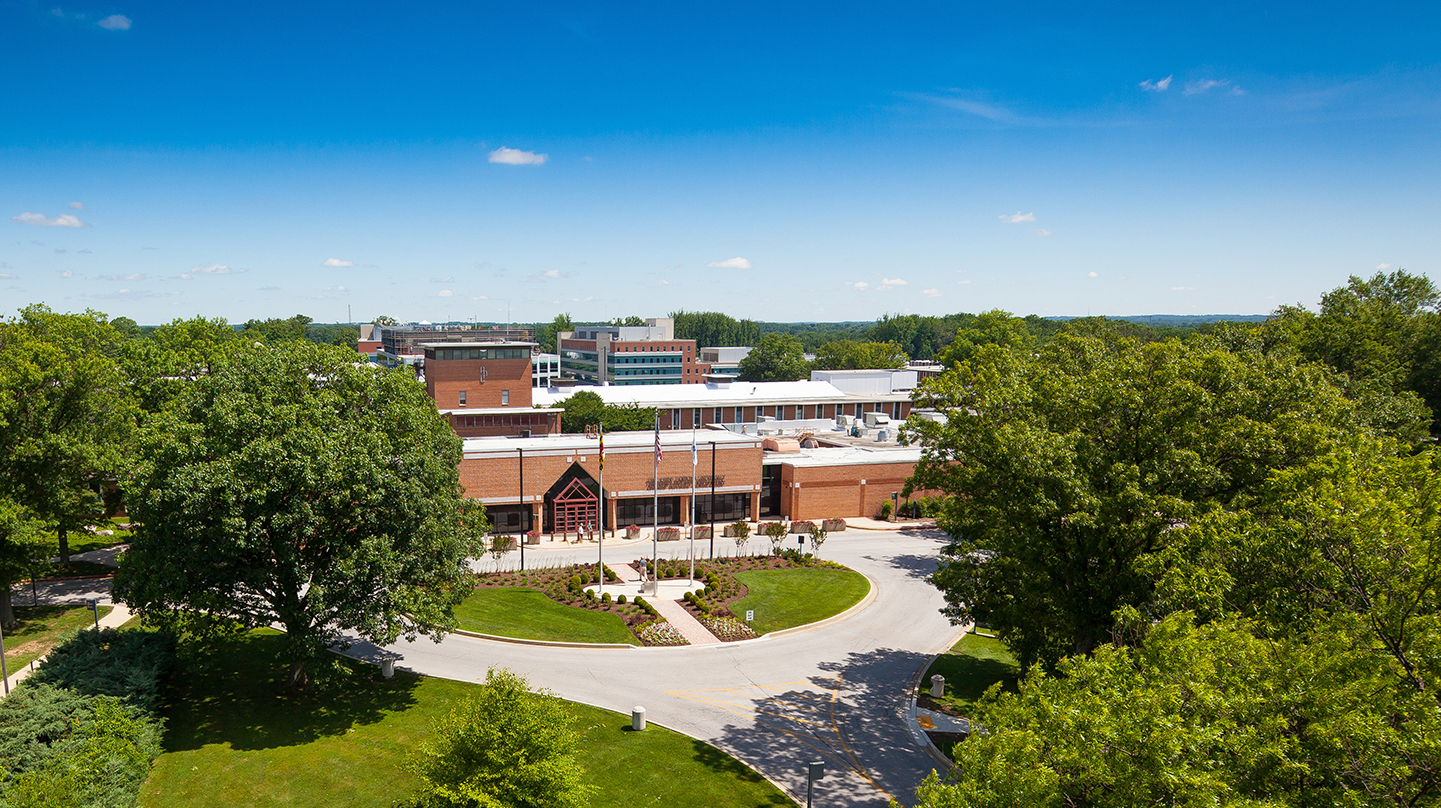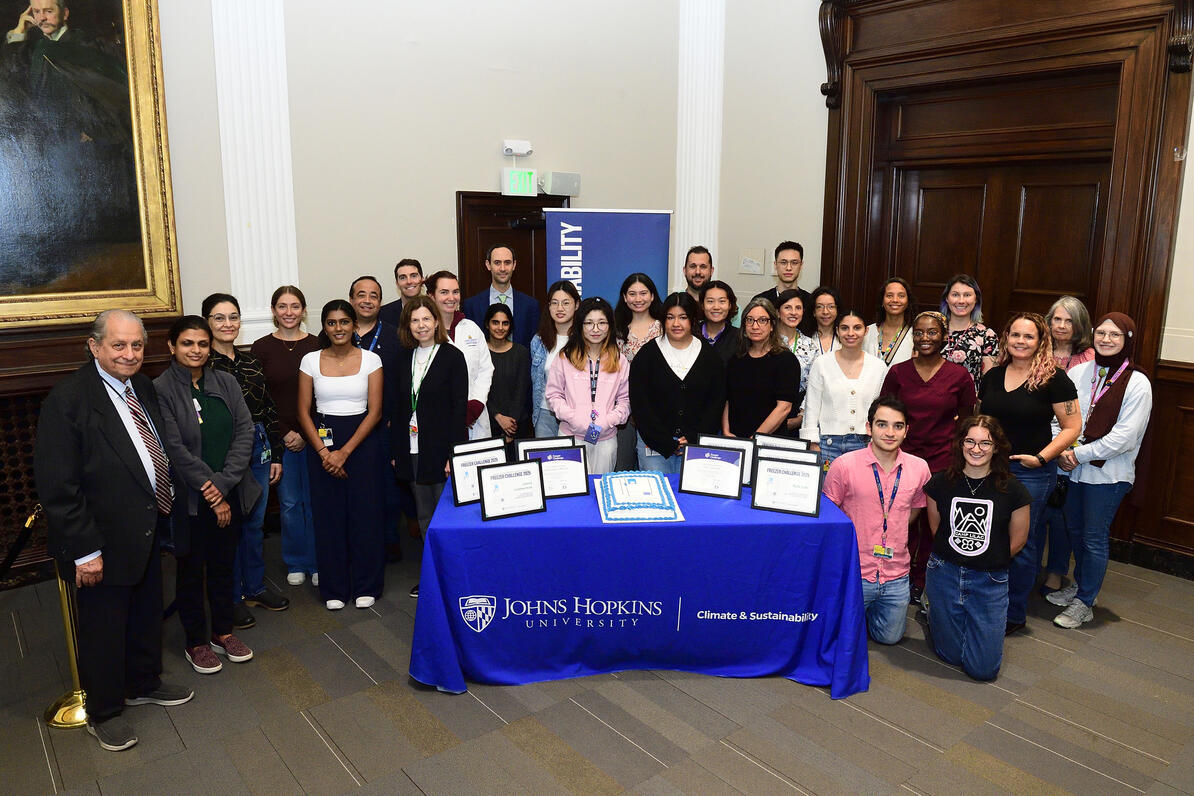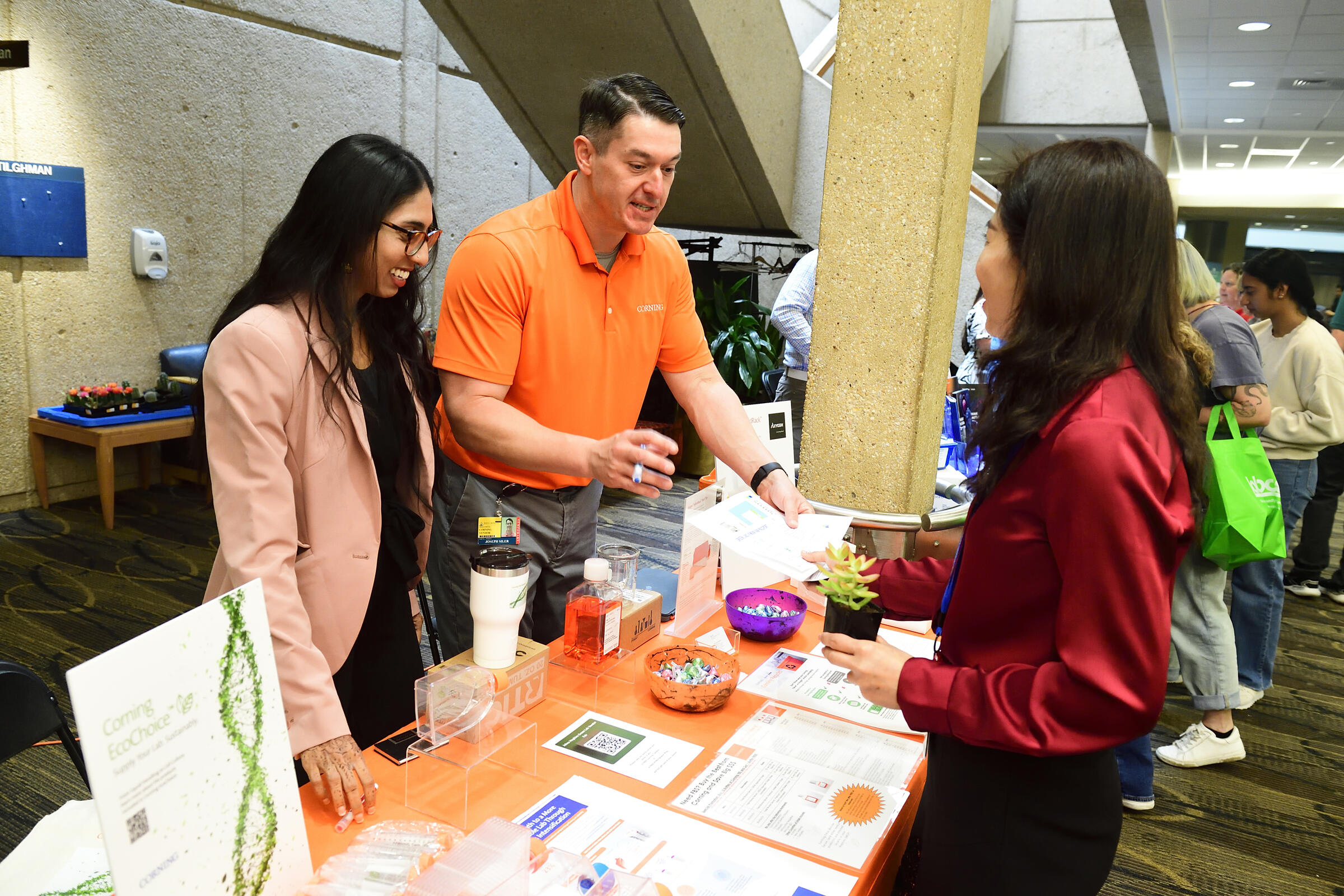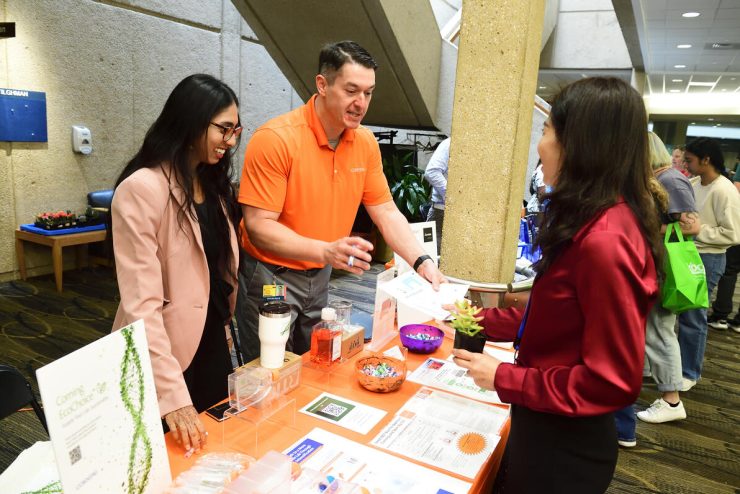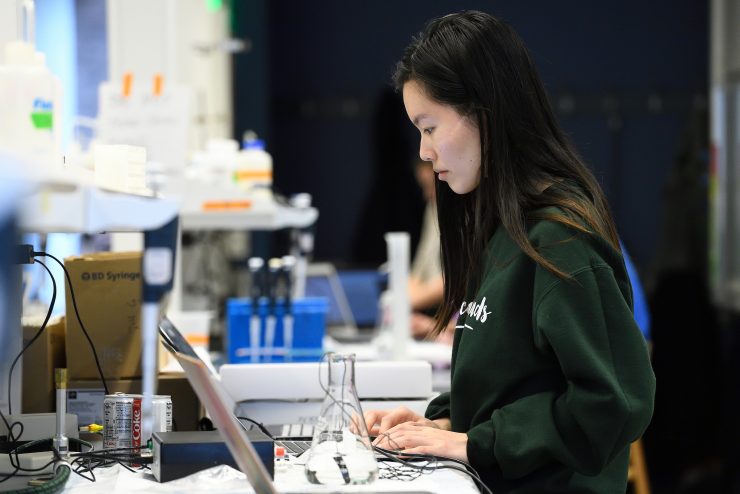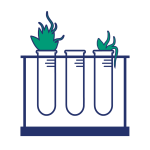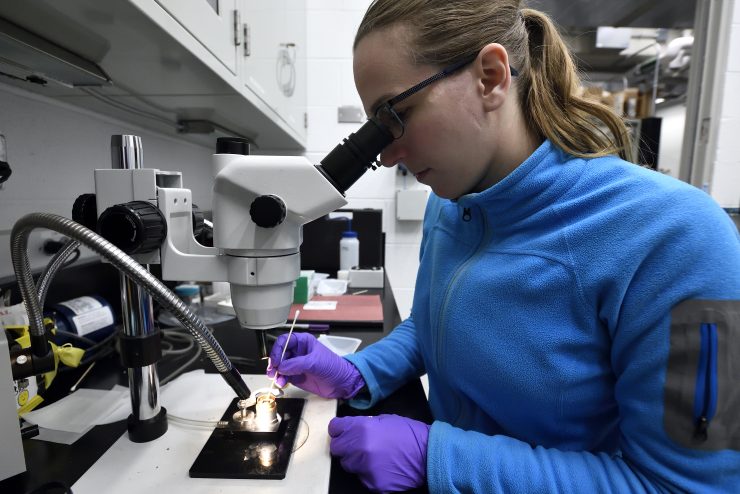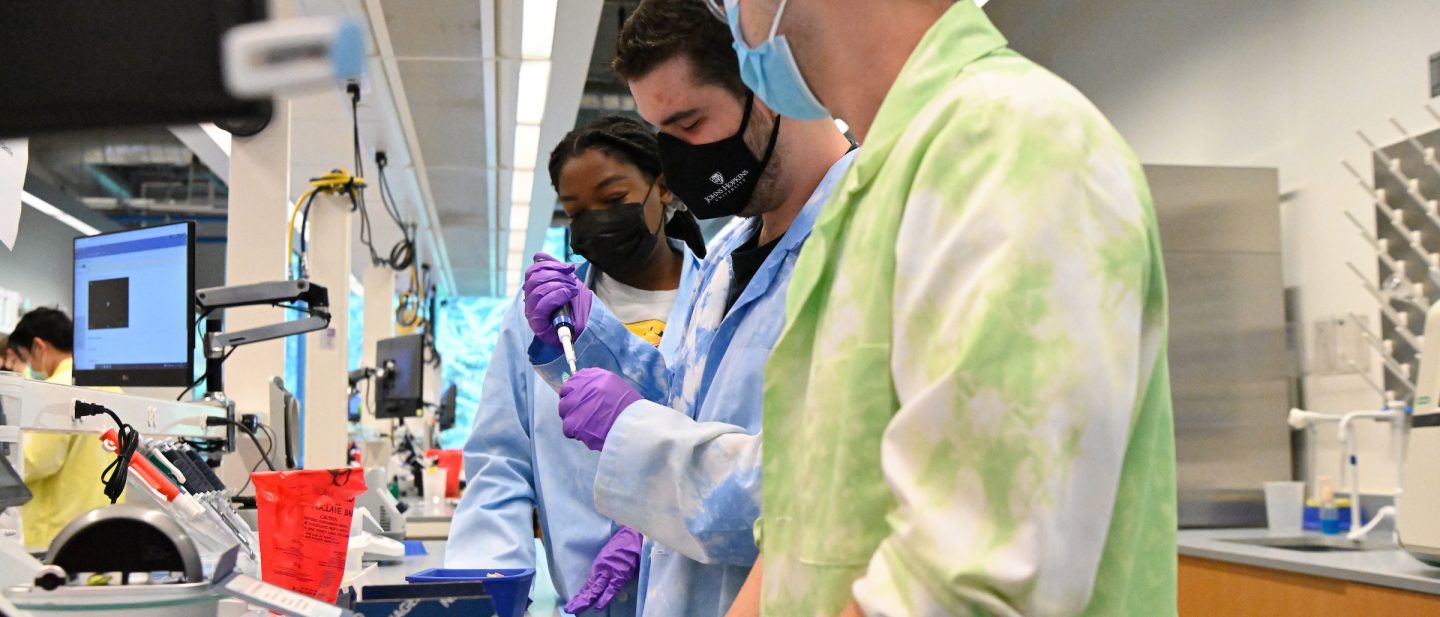
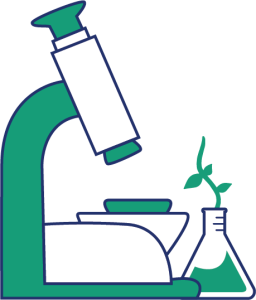 With thousands of research and teaching laboratories on JHU’s Homewood, East Baltimore, and APL campuses, labs represent a significant portion of the university’s physical footprint. However, they also present a unique sustainability challenge: they use 4-5x times more energy and water than a typical office building and generate large quantities of single-use waste annually.
With thousands of research and teaching laboratories on JHU’s Homewood, East Baltimore, and APL campuses, labs represent a significant portion of the university’s physical footprint. However, they also present a unique sustainability challenge: they use 4-5x times more energy and water than a typical office building and generate large quantities of single-use waste annually.
To address this challenge, the Office of Climate & Sustainability and Sustainability Leadership Council have founded numerous JHU Green Labs initiatives. Engaging faculty, staff, and student researchers, the Green Lab program aims to support lab users in fostering a culture of sustainability and learning, while minimizing waste and improving resource efficiency.
Contact our Green Labs team directly at [email protected].
2025 Inaugural Green Labs Vendor Fair and Lab Supply Swap
On June 3, 2025, over 200 students, researchers, and staff attended the Green Labs Vendor Fair, visiting with 22 vendors and organizations who provide sustainable lab supplies, services, and products to help reduce the environmental impact of their research. The first-ever Johns Hopkins Lab Supply Swap was held on July 22, 2025, at the Fisher Center.
Stay Informed
Subscribe to the monthly Green Labs newsletter to stay up-to-date on all Green Labs initiatives, receive tips on making your lab more sustainable, and share information with other lab users.
Past Editions
Explore previously published editions of the Green Labs Newsletter below.
Learn about green labs best practices and ways to reduce the environmental impact of labs below, ranging from online modules to in-person seminars.
The Office of Climate & Sustainability offers 15 – 60 minute trainings on a range of green labs practices including:
- Social and environmental impacts of research (NIH Responsible Conduct in Research topic)
- Role of scientists as responsible members of society (NIH Responsible Conduct in Research topic)
- Skills and professional development relating to green labs best practices
So far, dozens of programs and departments have received training from the Office of Climate & Sustainability. If you are interested in a green labs training for your program, department, or individual lab, please contact [email protected].
Facilitated by My Green Lab, the Green Lab Ambassador training is a short, online learning tool designed to educate scientists and laboratory professionals on sustainable laboratory practices. Globally, thousands of individuals in academic, government, and private-sector labs have become My Green Lab Ambassadors.
The 70-minute training consists of 4 modules that follow a single lab’s journey towards a sustainable laboratory environment through actionable steps in each of the following topical areas:
- Energy
- Waste
- Water
- Green Chemistry & Community
If you are a JHU affiliate, you can access the training through your myLearning Portal or by searching “Become a Green Lab Ambassador Training Bundle” (curriculum) in the myLearning course catalog. Follow the instructions on the Bundle homepage to complete the training, and ensure you upload the certificate of completion from My Green Lab once received. If you have any difficulties, email [email protected].
For those interested in learning beyond a single course, My Green Lab offers an Accredited Professional course on lab sustainability. Reach out to [email protected] to learn about fee reductions for JHU affiliates.
For a quick introduction to green labs best practices, review our Green Labs Best Practices Guide which covers topics including:
- Equipment plug loads
- Large equipment (fume hoods, biosafety cabinets, ultra-low temperature freezers)
- Green Chemistry
- Waste Reduction
- Infrastructure
Become a Certified Green Lab
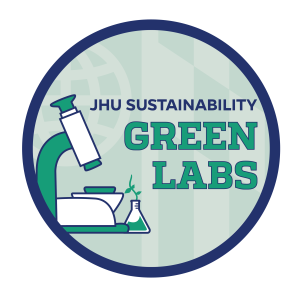
The Green Lab Certification process educates and engages JHU scientists who wish to reduce the environmental impact of their lab. By incorporating personalized best practices identified by the Office of Climate & Sustainability, labs can foster a culture of sustainability that can help preserve energy and water, reduce waste, and save money all while remaining safe and supporting the groundbreaking research done at JHU. Email [email protected] to learn more and get started today!
JHU uses the My Green Lab Certification, a regularly updated program that is the gold standard in laboratory sustainability best practices. The program is endorsed by the Association for the Advancement of Sustainability in Higher Education, International Institute for Sustainable Laboratories, and recognized as key measure of progress by the United Nations Race to Zero campaign for the pharma and medtech industries. Across the academic, government, and private sectors, over 2,500 labs have been certified using the My Green Lab Certification.
Certification is free for all JHU-affiliated labs but requires approval from the principal investigator or person in charge of the lab space. At least 50% of a lab’s personnel is required to participate, but for best results, full lab participation is encouraged. The process takes 6-12 months to achieve certification and is an empowering opportunity for JHU’s lab community. Labs are certified as Silver, Gold, Platinum, or Green Level based on performance, their self-assessment, and number of Sustainability Action points earned. Once certified, labs are encouraged to continue improving practices and recertify every two years.
The first two labs at JHU were certified in December 2020. As of July 2024, nearly 40 labs are involved in the certification process.
The JHU Green Lab Certification covers the 14 topic areas covered by the My Green Lab Certification seen below.
![]()
A lab reaches the Commitment Level after they agree to begin the certification process and are allotted up to 3 months to complete the baseline self-assessment. Following completion of the baseline self-assessment, they will remain at the Commitment Level until they have become certified.

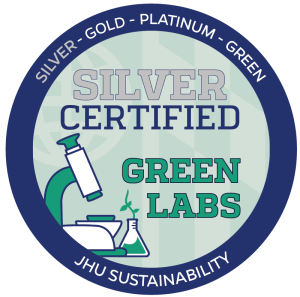
Silver Certified
- Hur Lab (WSE)
- Philip Lab (WSE)
- Durr Lab (WSE)
- Hristova Lab (WSE)
- JHU Genomics at 1812 Ashland Lab (SOM)
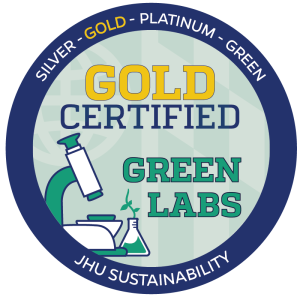
Gold Certified
- Wang Lab (WSE)
- Jeong Lab (WSE)
- Gu Lab (WSE)
- Sille Lab (BSPH)

Platinum Certified
- Fleming Lab (KSAS)
- Mao Lab (WSE)
- Jaffee Lab (SOM)

Green Certified
- Ostermeier Lab (WSE)
- Kokkoli Lab (WSE)
- Landscape Hydrology Lab (WSE/KSAS)
- EPS Rock Lab (KSAS)
- Kavran Lab (BSPH)
- GRCF DNA Services Lab (SOM)
- Polydefkis Lab (SOM)
- Arroyo Lab (SOM)
Join the Freezer Challenge
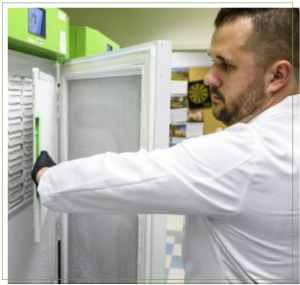 Did you know that ultra-low temperature (ULT) freezers (-70C and below) consume as much electricity as a typical single-family household and that JHU maintains over 1,500 ULT freezers? Lower your lab’s carbon footprint, improve sample safety, and prolong the life of your freezers by improving your cold storage practices.
Did you know that ultra-low temperature (ULT) freezers (-70C and below) consume as much electricity as a typical single-family household and that JHU maintains over 1,500 ULT freezers? Lower your lab’s carbon footprint, improve sample safety, and prolong the life of your freezers by improving your cold storage practices.
The 2026 Freezer Challenge starts in January 2026! Check back here for details and a sign-up link; and subscribe to the Green Labs newsletter to receive updates.
In addition to making your lab and JHU more sustainable, the top performing labs from each school/campus can win up to $3,000 in awards to be used for sustainable purchases, upgrades, or repairs. In previous years, labs have used their awards to make ULT freezer repairs and purchase new efficient freezers and other equipment.
Supported by the International Institute for Sustainable Laboratories and My Green Lab, the International Freezer Challenge is designed to promote best practices in cold storage management for laboratories around the world. Harnessing the spirit of competition, the challenge encourages laboratories to achieve greater energy efficiency, sample integrity, and sample access.
In 2025, 3,724 labs representing 286 organizations from 36 countries participated in the International Freezer Challenge to save 31.6 million kWh of energy. This amount of energy savings “helped reduce greenhouse gas emissions by 21,000 metric tons of carbon dioxide equivalent, which is equal to 5,000 gasoline-powered passenger vehicles removed from the road for a year.” This year, Johns Hopkins had 51 entries representing 79 labs across the university, collectively reducing energy consumption by an estimated 1,560 kWh/day, approximately the energy usage of more than 50 single-family homes per day!
The Freezer Challenge focuses on best practices in four key areas, many of which labs may already be doing.
- Inventory management
- Temperature tuning
- Retirements and upgrades
- Cutting-edge practices
JHU labs routinely are awarded with honors in the annual International Freezer Challenge.
In 2025, JHU won the Top Organization Award in the Academic Sector! In addition, two labs won individual honors:
- Academic Large Lab Winning Streak Award: School of Medicine, GI Oncology/Elizabeth Jaffee Lab
- Academic Medium Lab Award: School of Medicine, Quinn/Tobian Lab
In 2024, two JHU labs won individual honors:
- Academic Lab Winning Streak Award: School of Medicine, GI Oncology/Elizabeth Jaffee Lab
- Small Lab Award: School of Medicine, Yau Lab
In 2023, JHU won Institutional Honorable Mention in the Academic Organization category. In addition, three labs won individual honors:
- Top Large Academic Lab: School of Medicine, GI Oncology Lab
- Honorable Mention, Academic Category: School of Medicine, Quinn/Tobian Lab
- Honorable Mention, Academic Category: School of Medicine, Daniela Čiháková Lab
In addition to the International Challenge winners, JHU presents internal awards to the top performing labs on campus.
2025 Winners:
- School of Medicine – Large Lab: GI Oncology/Elizabeth Jaffee Lab
- School of Medicine – Small Lab: Meaghan Morris Lab
- Homewood Campus – Large Lab: Jeff Wang BioMEMS Lab
- Homewood Campus – Small Lab: Honggang Cui Lab
2024 Winners:
- School of Medicine – Large Lab: GI Oncology/Elizabeth Jaffee Lab
- School of Medicine – Small Lab: Yau Lab
- Homewood Campus: Townsend Lab
2023 Winners:
- School of Medicine: Quinn/Tobian Lab
- Bloomberg School of Public Health: Kellogg Schwab Lab
- Homewood Campus: Karen Fleming Lab
2022 Winners:
- School of Medicine: GI Oncology/Elizabeth Jaffee Lab
- Bloomberg School of Public Health: Ana Rule Lab
- Homewood Campus: Jeff Wang Lab
2021 Winners:
- School of Medicine: Daniela Čiháková Lab
- Bloomberg School of Public Health: Ana Rule Lab
- Homewood Campus: Jeff Wang Lab
Lab Waste & Recycling
JHU’s world-leading research produces hundreds of tons of laboratory waste annually. While much of this waste is required to be disposed as biohazardous waste, certain lab products can be diverted from landfill and incineration through specialty recycling or composting programs.
In addition to recycling and composting, consider other ways to reduce laboratory waste such as:
- Cutting down on purchasing needs
- Consolidating orders to reduce shipping and packaging
- Purchasing from JHU supply stores or core stores
- Switching to lab supplies made from renewable sources
- Polycarbon products are produced from recycled plastics (including from pipette tip boxes recycled at JHU!)
- Eppendorf Bio-based tubes are produced from recycled cooking oil
- Comparing ACT labels to ensure you are buying products with the lowest environmental impact (ACT label integration coming soon to LabViva)
Looking to Buy or Sell Used Lab Equipment?
Consider utilizing GovDeals, an online marketplace for educational and governmental institutions. Contact [email protected] for more information on setting up an account with your lab/department.
Explore the sections below to see what specialty recycling is available on your campus.
When considering specialty lab recycling below, please ensure your lab is adhering to guidelines outlined for hazardous and biohazardous waste as instructed by JHU Health, Safety, and Environment (HSE).
- #1 and #2 plastics
- Rinsed bottles and jugs with labels removed or defaced bottles
- Paper products such as cardboard and computer paper
- Including cardboard coolers and cardboard insulation
- Film plastic
- Rigid, white Styrofoam/expanded polystyrene
- Free of tape, labels, and packing peanuts
- Pipette tip boxes, wafers, cartridges and plastic conical tube racks
- NO PIPETTE TIPS
- Drop off locations on Homewood campus: Mudd Tunnel, Croft basement
- If you would like to request a drop-off location within your building, email [email protected]
- #1 and #2 plastics
- Rinsed bottles and jugs with labels removed or defaced bottles
- Paper products such as cardboard and computer paper
- Including cardboard coolers and cardboard insulation
- #1 and #2 plastics
- Rinsed bottles and jugs with labels removed or defaced bottles
- Paper products such as cardboard and computer paper
- Including cardboard coolers and cardboard insulation
- Pipette tip boxes, wafers, cartridges and plastic conical tube racks
- NO PIPETTE TIPS
- Drop off locations on E. Baltimore campus: MRB dock, CRB II dock, 2024 building, 1812 Ashland, the Genomic Center
- If you would like to request a drop-off location within your building, email [email protected]
Please note the above recycling may not be available in buildings that are primarily associated with Johns Hopkins Hospital.
Please email [email protected] for information on specialty recycling at the other JHU-affiliated campuses.
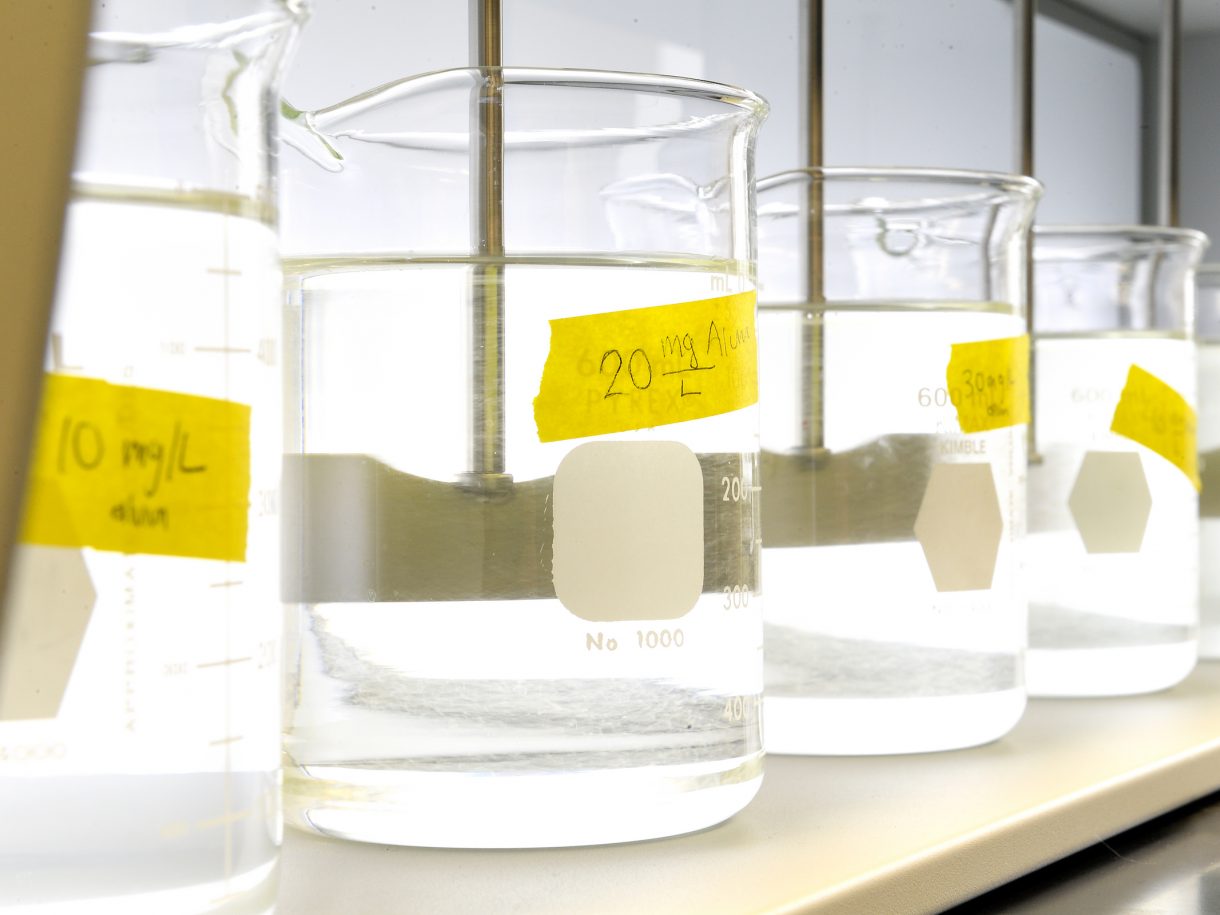
Green Labs Best Practices
To further reduce your environmental footprint, review our Green Labs Best Practices Guide. Feel free to use the version that best suits your needs!
